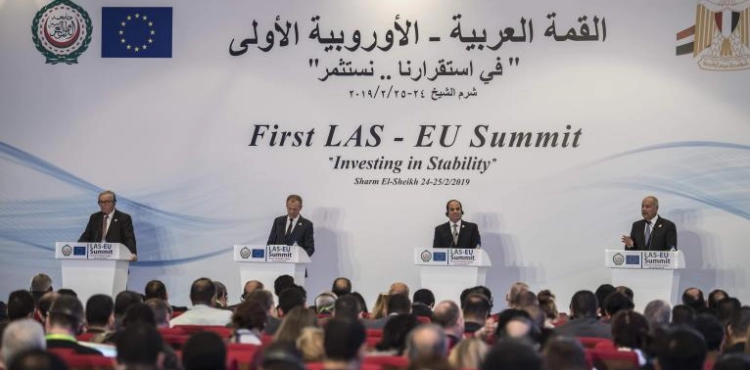Leaders of the European Union and the Arab League said at the end of their first joint summit in Sharm el-Sheikh in eastern Egypt on a "new era" in their relations despite differences in views, .
At the end of the summit, the heads of state and government of more than 40 countries decided to "start a new era of cooperation and coordination" to "promote stability, prosperity and well-being in both regions and the world at large," according to a joint statement.
"Differences, differences of views between us, especially in terms of respect for human rights, should not prevent us from looking to the future with hope," European Commission President Jean-Claude Juncker said during the final press conference.
For his part, Egyptian President Abdel Fattah al-Sisi, whose country hosted the summit, praised the quality of the talks on security, migration and economic development, as well as the Israeli-Palestinian conflict, the war in Yemen and Syria and the situation in Libya.
"We appreciate your words about the death penalty and respect it, but I hope you do not impose it on us," he added. "This is the culture we have."
Since the beginning of the year, Egypt has carried out the death penalty for 15 people, drawing criticism from human rights organizations. Cairo has also been criticized for the arrest of thousands of Islamist, liberal and leftist opponents.
The Gulf states also have a tough stance on the Islamic Republic, which accuses it of seeking to destabilize the Middle East and meddling in countries such as Syria, Yemen and Iraq, while European countries adopt a more lenient attitude towards them.
A Western diplomatic source said several Arab countries had hoped the statement would adopt a more assertive tone toward Iran, something the Europeans did not agree with.
German Chancellor Angela Merkel said in a press statement on Monday that she discussed issues she discussed with her counterparts such as the conflict in Syria, the situation in Libya, Iran and terrorism.
She stressed the need to reach a two-state solution to the Israeli-Palestinian conflict and to resolve the "terrible humanitarian catastrophe in Yemen".
However, Luxembourg Prime Minister Xavier Beetle told reporters in an effort to reduce expectations, it is naïve to think "we are meeting 24 hours in Sharm el-Sheikh, then peace will come to the world and the region and everything will end."
"It was the first time we met, I hope we will meet again, because it is important that we have discussions between us," he said.
For the Europeans, the summit should contribute to strengthening cooperation with Arab countries in order to stabilize the European presence in the southern Mediterranean against Russia and China, which seek to fill the vacuum left by the US withdrawal from the region.
European Council President Donald Tusk said Sunday that the two regions should work together for "the interests of the people" and not leave room for "international forces far from our region."
In remarks on the sidelines of the summit, Merkel told reporters that she spoke of the importance of improving the economic well-being of the Arab League countries, which can be achieved "only if civil society is strong and in respect of human rights" and "listen to young people."
Many Arab League members, including Egypt, the host country of the summit, have been criticized for human rights violations.
"The fate of the European Union depends to a large extent on the fate of the member states of the Arab League," she said.
British Prime Minister Theresa Mae on Sunday called for the United Kingdom to pull out of the European Union on March 29 without a deal to regulate relations.
Tusk left the door open Monday to give London an additional deadline.
But Europeans and their counterparts from Arab countries emphasized throughout the summit their determination to focus their efforts primarily on Arab-European cooperation.
"I will address this issue when the UK becomes a third country, and this is not the case now," said European Foreign Minister Federica Mugherini.
On Sunday evening, the Egyptian president called for "strong participation" in the summit, reflecting his country´s success after witnessing a long period of political and economic instability following the 2011 revolution that toppled Hosni Mubarak.
Among the few European leaders absent from the summit were French President Emmanuel Macaron, Spanish Prime Minister Pedro Sánchez and leaders of Lithuania and Latvia.
The next meeting between the two blocs is set for 2022 in Brussels.












